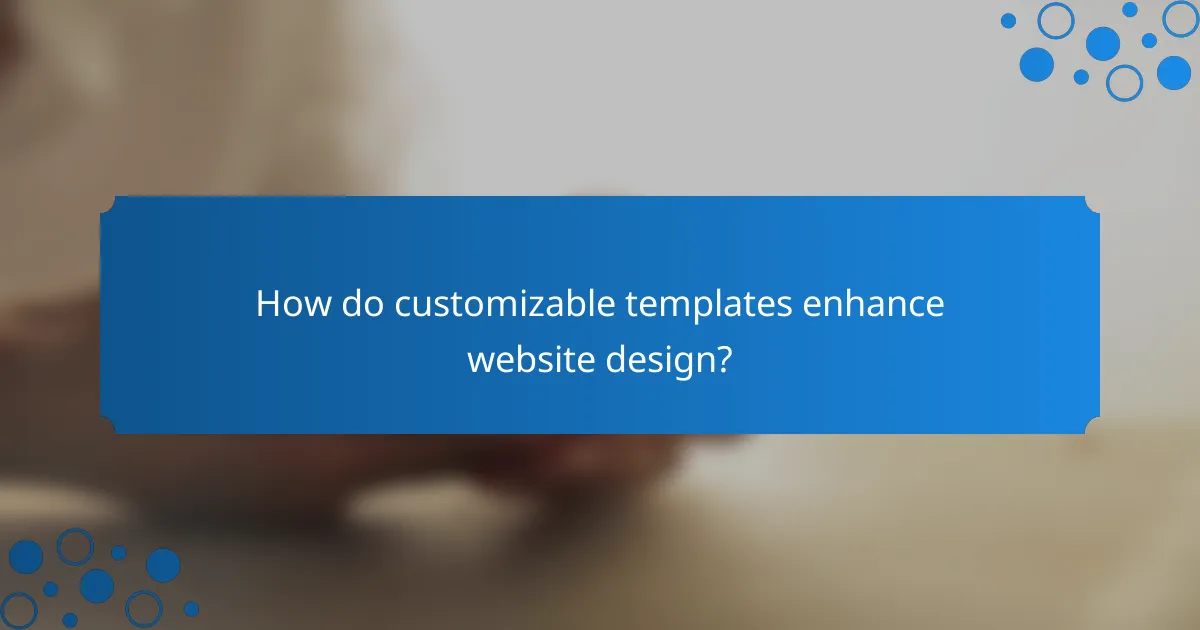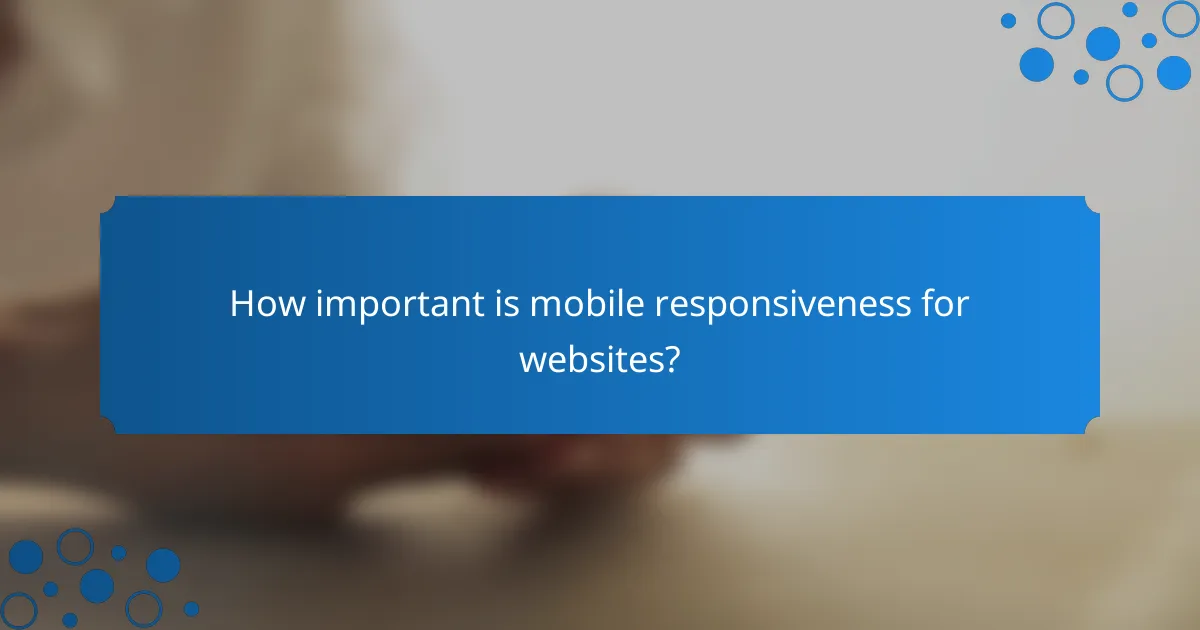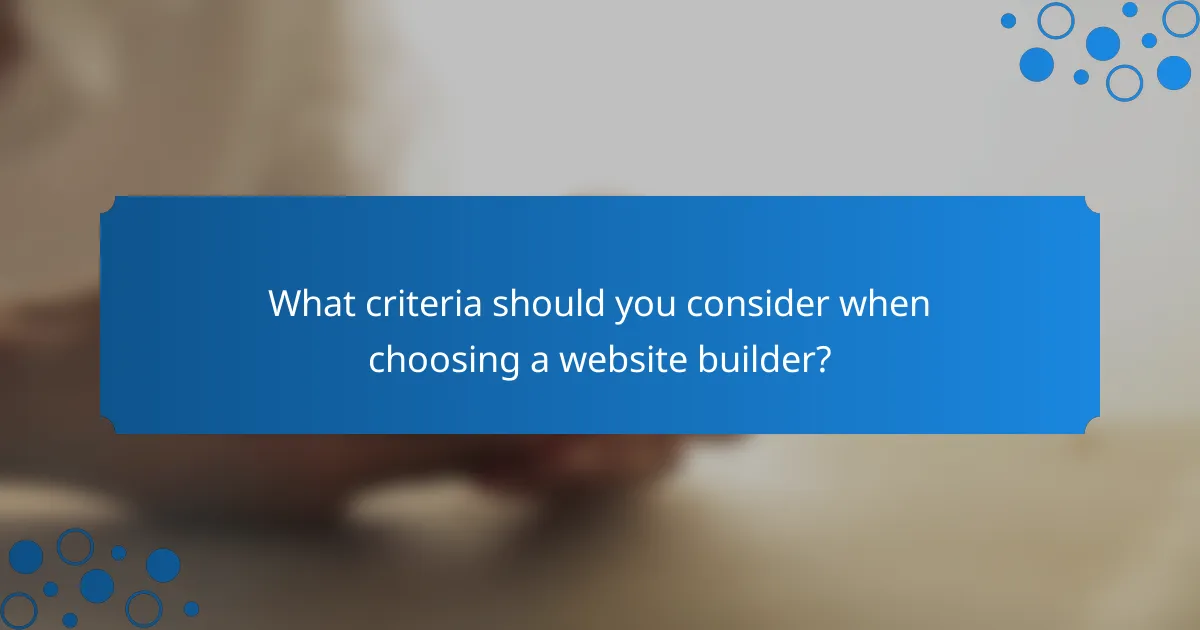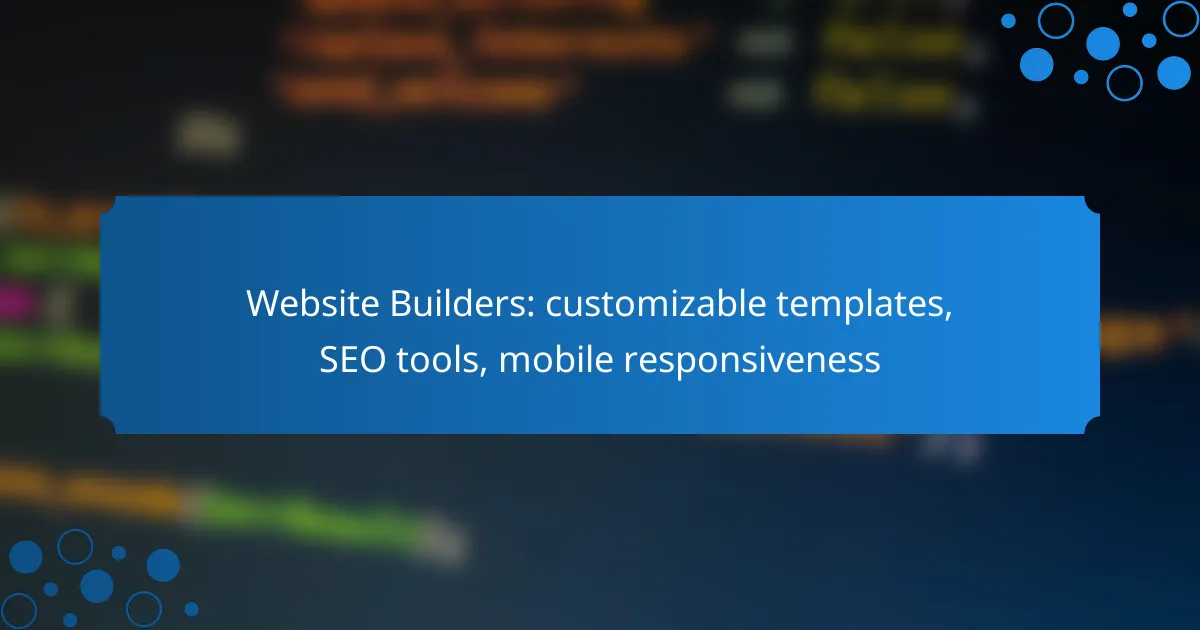Website builders provide an accessible way to create a professional online presence with customizable templates, SEO tools, and mobile responsiveness. Platforms like Wix, Squarespace, and Shopify allow users to design unique sites tailored to their needs while ensuring they are optimized for search engines and mobile devices. This combination of features helps businesses effectively engage their audience and enhance their visibility online.

What are the best website builders in New Zealand?
The best website builders in New Zealand include platforms that offer customizable templates, SEO tools, and mobile responsiveness. Popular options like Wix, Squarespace, Weebly, WordPress.com, and Shopify cater to various needs, from personal blogs to e-commerce sites.
Wix
Wix is known for its user-friendly drag-and-drop interface, making it easy for anyone to create a professional-looking website. It offers a wide range of customizable templates and robust SEO tools to help improve your site’s visibility.
Consider using Wix if you want a visually appealing site without extensive technical knowledge. However, be mindful of potential limitations in scalability as your business grows.
Squarespace
Squarespace excels in providing beautifully designed templates that are fully responsive on mobile devices. Its built-in SEO tools are straightforward, allowing users to optimize their content effectively.
This platform is ideal for creatives and small businesses looking to showcase their work. Keep in mind that while Squarespace offers great design flexibility, it may have a steeper learning curve compared to other builders.
Weebly
Weebly offers a simple drag-and-drop interface and is particularly suited for small businesses and online stores. It includes essential SEO features and customizable templates that can be tailored to your brand.
Choose Weebly if you prioritize ease of use and quick setup. However, its design options may not be as extensive as those offered by competitors like Squarespace.
WordPress.com
WordPress.com is a powerful platform that provides extensive customization options and a vast library of plugins for SEO and functionality. It is suitable for blogs, portfolios, and complex websites.
Consider WordPress.com if you need a highly customizable site. However, it may require more technical knowledge, especially if you want to leverage its full potential.
Shopify
Shopify is the go-to platform for e-commerce websites, offering a range of customizable templates and built-in tools for managing online sales. It provides excellent SEO features to help your store rank well in search engines.
Use Shopify if you are focused on selling products online. Be aware that while it is user-friendly, transaction fees may apply unless you use Shopify Payments.

How do customizable templates enhance website design?
Customizable templates significantly enhance website design by allowing users to tailor their sites to specific needs and preferences. This flexibility leads to a more engaging and effective online presence, as businesses can reflect their unique identity and cater to their target audience.
Personalization options
Customizable templates offer a variety of personalization options, enabling users to modify colors, fonts, layouts, and images. This adaptability allows businesses to create a distinctive look that resonates with their brand identity. For instance, a local bakery might choose warm colors and playful fonts to evoke a friendly atmosphere.
When selecting a template, consider the extent of customization available. Some platforms provide drag-and-drop editors, while others may require coding knowledge for deeper modifications. Aim for a balance between ease of use and the ability to achieve your desired design.
Brand consistency
Using customizable templates helps maintain brand consistency across all digital platforms. By ensuring that colors, logos, and messaging align with your overall branding strategy, you create a cohesive experience for users. This consistency reinforces brand recognition and trust among customers.
To achieve brand consistency, select templates that allow for easy integration of your brand elements. Regularly update your site to reflect any changes in branding, ensuring that all aspects of your online presence remain aligned.
User experience improvement
Customizable templates can significantly improve user experience by allowing for intuitive navigation and responsive design. A well-structured layout ensures that visitors can easily find information, leading to longer site visits and higher conversion rates. For example, a template with clear call-to-action buttons can guide users toward making a purchase.
Focus on usability when customizing your template. Avoid cluttered designs and prioritize mobile responsiveness, as a significant portion of users access websites via smartphones. Test your site on various devices to ensure a seamless experience for all visitors.

What SEO tools do website builders offer?
Website builders typically offer a range of SEO tools designed to enhance online visibility and improve search engine rankings. These tools often include features for keyword optimization, analytics integration, and meta tags management, each playing a crucial role in effective search engine optimization.
Keyword optimization features
Keyword optimization features help users identify and incorporate relevant keywords into their website content. Many website builders provide keyword suggestion tools that analyze search volume and competition, allowing users to select terms that can drive traffic.
Additionally, some platforms offer built-in suggestions for keyword placement within headings, body text, and image alt tags. This ensures that the website is more likely to rank well for those chosen keywords, enhancing overall SEO performance.
Analytics integration
Analytics integration allows website owners to track visitor behavior and measure the effectiveness of their SEO strategies. Most website builders support integration with popular analytics tools like Google Analytics, enabling users to monitor metrics such as traffic sources, bounce rates, and conversion rates.
By analyzing this data, users can identify which keywords and content are performing well and make informed adjustments to improve their SEO efforts. Regularly reviewing analytics can lead to more effective strategies and better search engine rankings.
Meta tags management
Meta tags management is essential for optimizing how search engines interpret a website’s content. Website builders typically offer user-friendly interfaces for editing title tags, meta descriptions, and header tags, which are critical for SEO.
Effective meta tags should include relevant keywords and provide a clear summary of the page content. Users should avoid keyword stuffing and ensure that each page has unique meta tags to enhance search engine visibility and improve click-through rates from search results.

How important is mobile responsiveness for websites?
Mobile responsiveness is crucial for websites as it ensures that content displays correctly on various devices, enhancing user experience. A responsive design adapts to different screen sizes, which is essential given the increasing use of smartphones for browsing.
Improved user engagement
When a website is mobile responsive, users are more likely to stay longer and interact with the content. This leads to lower bounce rates and higher engagement metrics, as visitors can easily navigate and find what they need without frustration.
To boost user engagement, ensure that buttons are easily clickable, text is legible without zooming, and images scale appropriately. Consider testing your site on multiple devices to identify any usability issues.
Higher search engine rankings
Search engines like Google prioritize mobile-friendly websites in their rankings. A responsive design can significantly improve your site’s visibility in search results, driving more organic traffic.
To enhance your SEO, use tools to check your website’s mobile performance and make necessary adjustments. Regularly updating content and optimizing loading speeds can further improve rankings.
Accessibility across devices
Mobile responsiveness ensures that your website is accessible on various devices, from smartphones to tablets and desktops. This broad accessibility is vital for reaching a wider audience.
Implementing a responsive design means that all users, regardless of the device they use, have a consistent experience. This approach not only meets user expectations but also aligns with web accessibility standards, making your site usable for people with disabilities.

What criteria should you consider when choosing a website builder?
When selecting a website builder, focus on customization capabilities, SEO features, and mobile responsiveness. These criteria will significantly impact your site’s performance, user experience, and visibility in search engines.
Customization capabilities
Customization capabilities refer to how much you can tailor your website’s design and functionality to meet your specific needs. Look for builders that offer a wide range of templates and allow you to modify elements such as colors, fonts, and layouts easily.
Consider whether the platform supports drag-and-drop functionality, which can simplify the design process. Some builders may also provide advanced options like custom CSS for deeper customization, catering to users with coding knowledge.
SEO features
SEO features are essential for improving your website’s visibility in search engine results. A good website builder should include tools for optimizing meta tags, alt text for images, and URL structures, making it easier for search engines to index your site.
Check if the builder offers built-in analytics to track your site’s performance and identify areas for improvement. Additionally, features like mobile optimization and fast loading times contribute positively to SEO, so ensure these are included in your selection criteria.
